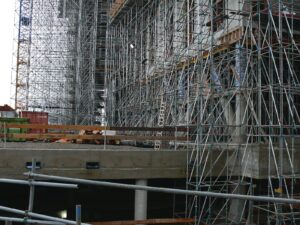In the fast-paced and intensely competitive landscape, sustaining success in the construction sector requires a strategic edge. Outsourcing estimating services is one unique tactic that has been remarkably popular in recent years. Accurate cost estimations are fundamental to any successful building project. Acknowledging this, more and more industry participants opt for outsourcing as a strategic benefit beyond simple cost reduction.
A level of accuracy and knowledge that goes well beyond the norm is required in the construction industry, which is defined by the complex interactions between schedules, finances, and other project needs. Construction companies are realizing the transformative power of outsourcing as the crucial estimating process. This strategic approach offers many benefits over the project’s lifespan, making it far more than just a financial decision.
Outsource estimation emerges as a cost-effective solution that also catalyzes operational efficiency, risk mitigation, and scalability, from negotiating the complexities of business trends to exploiting sophisticated technology. Accompany us on this voyage across the complex terrain of contracting out estimating services, discovering how this modern methodology changes the fundamentals of success in the building sector.
Expertise and Specialization
Construction estimating is a specialized skill that requires a thorough awareness of labor costs, materials, industry trends, and local legislation. It demands expertise in the field. This expertise can contribute to more accurate and reliable cost estimates, reducing the risk of budget overruns.
A group of knowledgeable people join the team of construction companies who choose to outsource their estimating work. These experts are seasoned professionals who understand the nuances of construction.
These outside specialists possess a unique ability to understand the finer points of construction expenses, supplies, and all applicable regulations. It’s similar to having a superhero squad that predicts events before they occur. They ensure the building project continues on schedule and stays within budget.
Cost Savings
An in-house estimating staff requires the appropriate arrangement, including workspace, machinery, and computers. There may be significant cost reductions when estimation is outsourced. Also, hiring a few people isn’t enough when you choose to continue doing estimates internally. They also need to be trained. Timing is a luxury in the fast-paced construction industry, as training requires both money and time. Obtaining the appropriate tools to calculate those figures also comes with a cost. The cost of purchasing high-quality estimating software and maintaining its updates with the newest capabilities might cause a financial burden.
Efficiency and Timeliness
The effectiveness of the estimating phase is critical in the fast-paced world of construction, where project timeframes are critical. A series of setbacks across the entire construction process can result from delays at this early stage. Equipped with modern equipment and technology, professional estimating services become invaluable partners in this time-critical environment. These services promise accuracy and reliability in addition to providing quick estimates.
Scalability
Project sizes and scopes change significantly in dynamic construction companies. The ability to scale up or down in response to project requirements is made possible via outsourcing. Outsourcing estimating services may adjust to the construction company’s needs, guaranteeing the best use of resources, regardless of the size of the project—residential development or a large-scale commercial project.
Risk Mitigation
In the construction industry, one miscalculation in estimating can have a knock-on effect on the entire project, resulting in disagreements that affect budgets, schedules, and reputations. Professional construction estimators are proactive in preventing these kinds of situations. Expert estimators use strict quality control procedures to reduce mistakes and ensure estimate accuracy. They serve as risk mitigators by observing and fixing possible errors, protecting the construction company’s profits, and—perhaps more importantly—improving its standing as a dependable and competent company.
Focus on Core Competencies
Construction companies can focus on their core competencies by outsourcing estimates, which is an economical approach and a strategic realignment. Construction companies free up their resources from the complexity of number-crunching and refocus them on their core skills by outsourcing estimates to outside professionals.
Moreover, when the internal staff is free from cost estimation projects, they are capable of dealing with the clients more efficiently, fully comprehending the requirements of every project, and significantly improving client satisfaction, which, as a result, leads to more clients.
Access to Advanced Technology
Technology for estimating is constantly changing, improving, and evolving. Like tech trendsetters, professional estimating services keep ahead of the curve by investing in the newest and most advanced tools for accurate estimates. The best thing is that construction companies may enjoy the technology rollercoaster without paying a premium price when they collaborate with these tech-savvy experts through outsourcing.
Conclusion
For construction companies trying to improve their efficiency and competitiveness, outsourcing estimates is now a strategic choice rather than merely a way to save costs. The benefits, which include risk avoidance, cost savings, scalability, and access to specialized knowledge, make outsourcing estimates an essential weapon in the construction industry’s toolbox. Construction companies can streamline their processes and prosper in the competitive business by seizing this strategic advantage.



